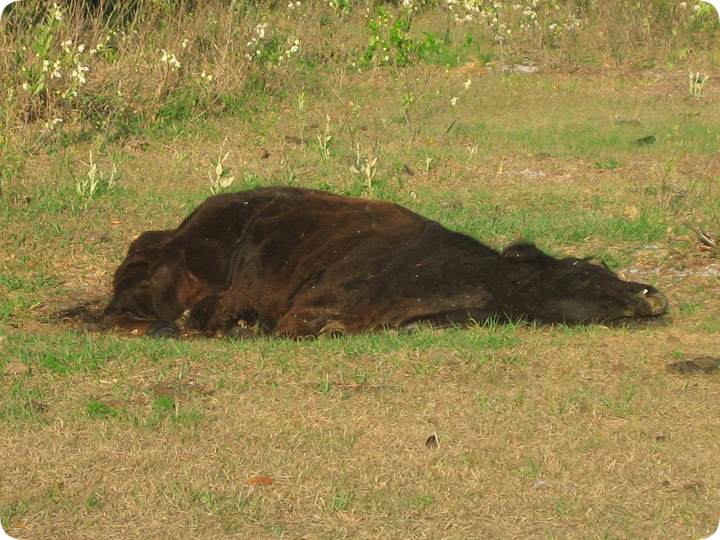-
info@aaanimalcontrol.com
Call us for help in your town
Humane Wildlife Education
Dead Bear? No! Dead Cow!

04.03.2005 - How now, brown cow? Dead, that's how. I received several phone calls about a dead bear just off Rt. 417 near the Conway exit. One
person said that it was a 12-foot dead bear. These calls piqued my curiosity, so I resolved to see the giant dead bear. During my normal day of nuisance
wildlife control work, as I traveled along Rt. 417, I remembered to stop and take a look. I saw several cars pulled off to the side of the road on the
northbound side (where the dead bear was), and traffic slowing on the other side of 417 as well.
I became very excited, with a rapid heartbeat and sweaty
palms and even a bit of shaking. I was about to see a giant dead bear! Very exciting! I parked on the side of the road, jumped out, and saw this dead
cow. That's right, a dead cow. A boring old, plain old, run of the mill dead cow. I've already seen dozens of dead cows! Hundreds probably! And here
was yet another one. Yawn. No wait, not yawn, scowl. Why had several people called me to report a dead bear. Were they that dumb? Yes, yes they were.
They mistook a large cow-shaped animal dead in a cow field for a dead bear. I dejectedly got back in my truck and drove off. I guess a dead bear will have
to wait for another day.
Hefer hits the dust.
Do it yourself: Visit my How To Find and Get Rid of Dead Animals page for tips and advice.
Get professional help: Visit my Nationwide Pro Directory of dead wildlife removal experts.
For more wildlife stories, click my Wildlife Blog
or click my below banner to hire a local trapper.
If you think you see a dead bear, take a closer look. In all likelihood, you're looking at a dead cow. Cows also have brown fur and are extremely large, so look carefully!
What should you do if you find a dead cow? Or in fact, a dead bear? Firstly, it's very important not to touch dead animals.
Let's have a quick biology lesson to explain why dead beings smell and why it's so important to remove them safely. All living creatures contain a very small amount of sulfur, approximately around 0.85% sulfur. As an animal decomposes, a series of chemical reactions produce an odor that's not only terribly unpleasant but harmful too. It could be that our aversion to bad smells and decay is actually a defense mechanism to help us avoid disease and bacteria.
Bacteria flood a carcass and start breaking down the chemical components inside the animal. These bacteria cause the body to produce over 400 different chemical compounds like hydrogen sulfide, methanethiol, and benzene derivatives. Together these create the unmistakable stench of death. Many of these compounds are harmful to humans and some are released as gases. Gas from a dead body can cause headaches and nausea to humans that go near it.
Then we have to deal with the fact that dead bodies are perfect for bacteria to grow and bring up little baby bacteria that can be really bad for animals and humans. These sorts of harmful bacteria can either be passed around by maggot spawned flies or by noxious fumes and we're talking about bacteria such as rabies for example, or salmonella. There are also a fun bag of creatures that can make us very ill such as fleas and ticks.
Apart from the health problems, dead animals will start to smell bad, real bad.
The biggest health concern that we're worried about with dead animals is the concern of toxins from the body leaching into water supplies. People or pets who drink contaminated water can become seriously ill. Not to mention that maggots will infest the body and flies will spread diseases.
Ok, so we need to dispose of dead animals properly. But what about large animals such as cows or bears? Once again, it's so rare that you'll find a dead bear, usually, it's just a cow that people didn't look too closely at.
In this case, do not go near the dead animal and call your local authority. You could call a wildlife removal expert to give you the correct number to call in your state department because large animals need to be removed by licensed professionals.




















